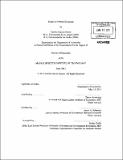Essays in political economy
Author(s)
García Jimeno, Camilo
DownloadFull printable version (16.88Mb)
Other Contributors
Massachusetts Institute of Technology. Dept. of Economics.
Advisor
Daron Acemoglu and James A. Robinson.
Terms of use
Metadata
Show full item recordAbstract
This dissertation consists of three essays. The first chapter is an empirical investigation of social change, looking at the Prohibition Era in the U.S. It explores how the implementation of policies affects the evolution of beliefs about their effects, giving rise to a feedback between preferences and policy choices. Using city-level data on law enforcement and crime, it estimates a structural model where crime outcomes are the result of Prohibition enforcement, and lead to changes in public opinion about Alcohol-related policies. Enforcement depends on moral views and beliefs, but only beliefs are shaped by the outcomes of past policies. The model can account for the variation in public opinion changes, and for the heterogeneous responses of enforcement and violence across cities. Its estimates are used to perform a series of counterfactual exercises. The second chapter is a theoretical investigation of entrenchment and encroachment of rulers. It studies the strategic interaction between competition and ratchet effect incentives in a coalition-formation game of incomplete information. Rulers require the support of a subset of politically powerful groups to remain in power. These have private information about their cost of providing political support. A ruler can attempt to exploit the competitive nature of the coalition formation game to induce revelation. Its ability to do so determines the extent of entrenchment and encroachment. By restricting attention to Markov Perfect Bayesian equilibria, the model shows that limited learning is possible, and that learning dynamics are shaped by an informational commitment problem arising when rulers are "too optimistic". In joint work with James Robinson, the final chapter is a comparative empirical study of the impact of Frontier availability on long-run development across the Americas. It calls into question the notion of American exceptionalism due to its Westward Frontier, first proposed by Frederick J. Turner. Almost every country in the Americas had a substantial Frontier, but its allocation varied due to differences in the quality of political institutions around the mid-19* century, making the effect of the Frontier conditional on political institutions at the time of Frontier expansion. The empirical evidence is consistent with this "conditional Turner thesis".
Description
Thesis (Ph. D.)--Massachusetts Institute of Technology, Dept. of Economics, 2011. Cataloged from PDF version of thesis. Includes bibliographical references.
Date issued
2011Department
Massachusetts Institute of Technology. Department of EconomicsPublisher
Massachusetts Institute of Technology
Keywords
Economics.